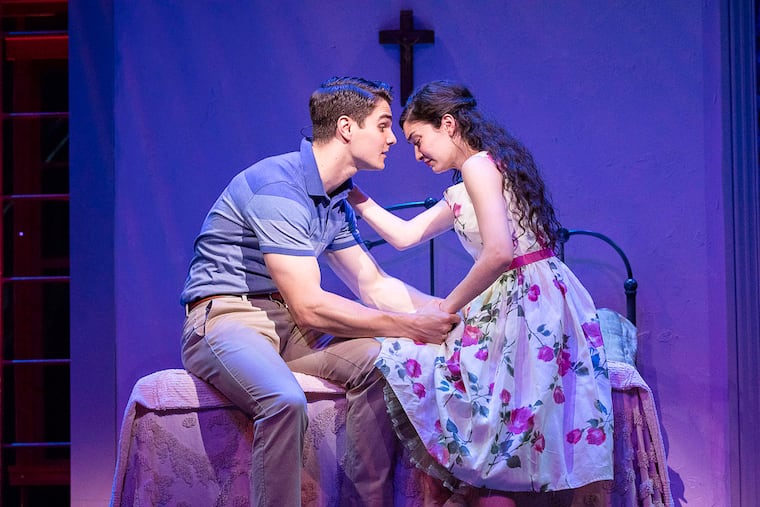West Side Story: Immigration, nativism, gun violence redux
With controversy over immigration, nativist tensions and gun violence dominating the news, the Pennsylvania Shakespeare Festival's elegant production of West Side Story has a ripped-from-the-headlines feel.

With controversy over immigration, nativist tensions and gun violence dominating the news, the Pennsylvania Shakespeare Festival's elegant production of
West Side Story
has a ripped-from-the-headlines feel.
Instead of a border wall, set designer Steven TenEyck's chain-link fence represents the ethnic divides and misunderstandings that will lead to tragedy. There's more foreshadowing in the blood-red color of the tenements in which Tony and Maria, the show's contemporary Romeo and Juliet, pledge their undying love.
With a book by Arthur Laurents, music by Leonard Bernstein, lushly romantic lyrics by a young Stephen Sondheim and, above all, the jazz-infused choreography of Jerome Robbins, West Side Story (which debuted on Broadway in 1957) is rightly considered a masterpiece of the American musical theater.
Its passionate plea for tolerance is wedded to an inquiry into the complexities of American identity and ethnic assimilation - concerns at once timeless and newly relevant. But it remains, too, a document of its era, showcasing the language ("cool," "daddy-o"), mores, gender assumptions, and character types of its day. "Gee, Officer Krupke," one of this production's many stellar set pieces, satirizes the 1950s concept of juvenile delinquency and the jargon of the helping professions.
Choreographer Stephen Casey has ably restaged Robbins' iconic dances, with their sharp edges and balletic turns. The dance stars are Nathan Madden's graceful Riff, leader of the Jets, the "American" gang, and Karli Dinardo's fiery Anita, whose boyfriend Bernardo (a menacing Charles South) is both the leader of the Puerto Rican Sharks and Maria's overprotective brother. Anita's denigration of her native Puerto Rico and celebration of her new life in "America" is a combustible tour-de-force of dance, song and acting that acquires ironic resonance in the second act.
The edgy antagonisms of the two gangs are, of course, juxtaposed against the unworldly, fairy-tale love of Tony and Maria, both clad by costume designer Michael McDonald in virginal white. Austin Colby and MaryJoanna Grisso played opposite each other in a successful Signature Theatre production of West Side Story, in Arlington, Va., and it was a coup to reunite them. Colby is a fragile-seeming Tony, so handsome he is almost pretty, and his spectacular tenor shines in "Something's Coming" and "Tonight." Grisso's greatest gift is in conveying Maria's emotional arc, from wonder to unbridled, bride-like joy to desolation.
Under the tough-minded direction of Dennis Razze, the festival's associate artistic director, minor characters - especially the individual Jets - are sharply defined, and the show's still shocking ethnic slurs carry a fresh sting. The climactic taunting of Anita, underscored by a sardonic orchestral reprise of "America," has the emotional force of a rape scene.
The 15-piece orchestra sounds great, and this production looks as good as it sounds - from Arianna Knapp's grittily realistic black-and-white projections of New York streetscapes to Eric T. Haugen's moody dramatic lighting. But its main virtue, in the end, is how it makes us feel: sad, moved, hopeful - and mindful of the danger of allowing ethnic animosities to trump American ideals.
THEATER REVIEW
West Side Story
Presented through July 3 by the Pennsylvania Shakespeare Festival at DeSales University, Center Valley.
Tickets: $25-$60.
Information: 610-282-9455 or www.pashakespeare.org
EndText